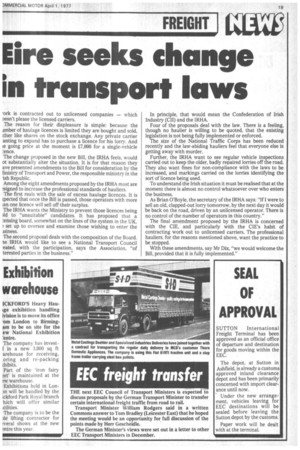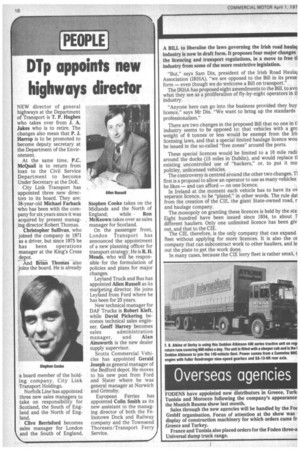Eire seeks change
Page 21

Page 20

If you've noticed an error in this article please click here to report it so we can fix it.
in transport laws
A BILL to liberalise the laws governing the Irish road haulai industry is now in draft form. It proposes four major changes the licencing and transport regulations, in a move to free ti industry from some of the more restrictive legislation.
"But," says Sam Dix, president of the Irish Road Haulai Association (IRHA), "we are opposed to the Bill in its prese] form — even though we do welcome a Bill on transport."
The IRHA has proposed eight amendments to the Bill, to avo what they see as a proliferation of fly-by-night operators in 0 industry.
"Anyone here can go into the business provided they buy licence," says Mr Dix. "We want to bring up the standards professionalism."
There are two changes in the proposed Bill that no one in ti industry seems to be opposed to: that vehicles with a gro weight of 6 tonnes or less would be exempt from the hi: licensing laws, and that a special limited haulage licence wou be issued in the so-called "free zones" around the ports.
These special licences would be limited to a 10 mile radii around the docks (15 miles in Dublin), and would replace ti existing uncontrolled use of "hackers," or, to put it mo politley, unlicensed vehicles. The controversy is centred around the other two changes. TI first is a proposal to allow an operator to use as many vehicles he likes — and can afford — on one licence.
In Ireland at the moment each vehicle has to have its ov separate licence, to be "plated," in other words. The rule dat from the creation of the CIE, the giant State-owned road, r and haulage company.
The monopoly on granting these licences is held by the stal Eight hundred have been issued since 1934, to about 7 different hauliers. Only one unlimited licence has been giv out, and that to the CIE.
The CIE, therefore, is the only company that can expand fleet without applying for more licences. It is also the or company that can subcontract work to other hauliers, and le out the plate to get the work done.
In many cases, because the CIE lorry fleet is rather small, t 'ork is contracted out to unlicensed companies — which Desn't please the licensed carriers.
The reason for their displeasure is simple: because the umber of haulage licences is limited they are bought and sold, ither like shares on the stock exchange. Any private carrier anting to expand has to purchase a licence for his lorry. And ie going price at the moment is £7,000 for a single-vehicle :ence.
The change proposed in the new Bill, the IRHA feels, would ot substantially alter the situation. It is for that reason they ave presented amendments to the Bill for consideration by the linistry of Transport and Power, the responsible ministry in the ish Republic.
Among the eight amendments proposed by the IRHA most are .signed to increase the professional standards of hauliers.
The first reals with the sale of excess haulage licences. It is Epected that once the Bill is passed, those operators with more an one licence will sell off their surplus.
The IRHA wants the Ministry to prevent those licences being ald to "unsuitable" candidates. It has proposed that a :ensing board, somewhat on the lines of the system in the UK, set up to oversee and examine those wishing to enter the Isiness.
The second proposal deals with the composition of the Board. IRHA would like to see a National Transport Council eated, with the participation, says the Association, "of terested parties in the business." In principle, that would mean the Confederation of Irish Industry (CII) and the IRHA.
Four of the proposals deal with the law. There is a feeling, though no haulier is willing to be quoted, that the existing legislation is not being fully implemented or enforced.
The size of the National Traffic Corps has been reduced recently and the law-abiding hauliers feel that everyone else is getting away with murder.
Further, the IRHA want to see regular vehicle inspections carried out to keep the older, badly repaired lorries off the road. They also want fines for non-compliance with the laws to be increased, and markings carried on the lorries identifying the sort of licence being used.
To understand the Irish situation it must be realised that at the moment there is almost no control whatsoever over who enters the business.
As Brian O'Boyle, the secretary of the IRHA says: "If I were to sell an old, clapped-out lorry tomorrow, by the next day it would be back on the road, driven by an unlicensed operator. There is no control of the number of operators in this country."
The final amendment proposed by the IRHA is concerned with the CIE, and particularly with the CIE's habit of contracting work out to unlicensed carriers. The professional hauliers, for the reasons mentioned above, want the practice to be stopped.
With these amendments, say Mr Dix, "we would welcome the Bill, provided that it is fully implemented."
































































































